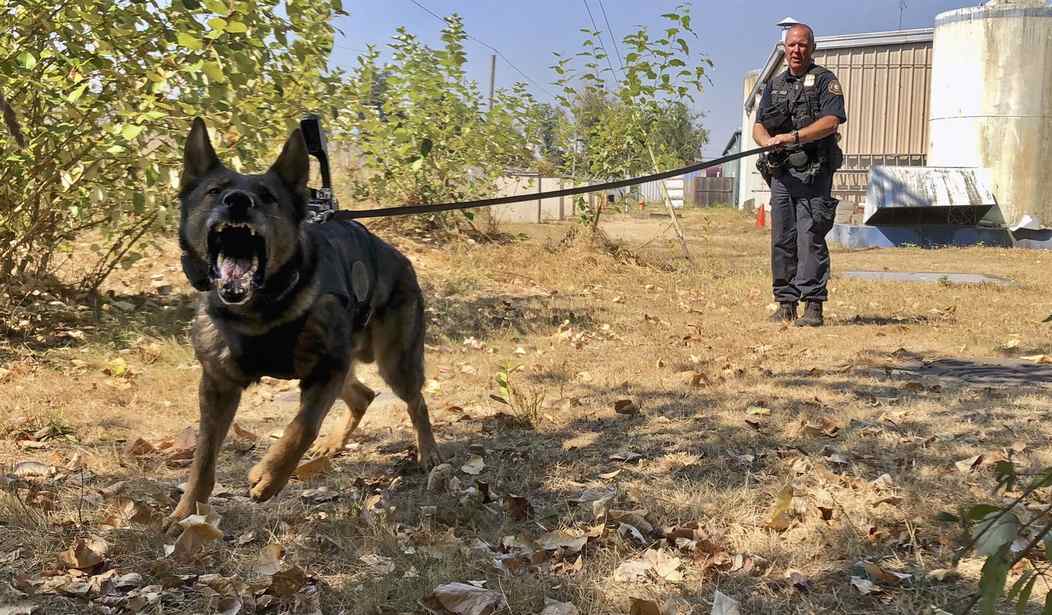Apparently, tyranny isn’t just for humans working with the government. Even dogs can be used by law enforcement for unconstitutional abuses according to recent reports. As it turns out, police dogs, who are commonly viewed as an effective means for rooting out crime, tend to bark up the wrong tree during traffic stops more often than we might have assumed.
A federal lawsuit filed in Texas, exposing the potential misuse of drug-sniffing dogs by law enforcement, sheds light on what might be a long-standing problem within the criminal justice system. The case highlights the need for greater scrutiny and reform surrounding the use of these canines as an investigative tool.
NPR reported:
A newly filed federal lawsuit in Texas shows cameras’ potential to undermine K-9 unit legitimacy. Houston resident Alek Schott accuses Bexar County Sheriff’s deputy Joel Babb of pulling him over on Interstate 35 on false pretenses, and then, when he refused to give permission to search his pickup truck, he says K-9 unit deputy Martin A. Molina III prompted his dog to “alert” to the scent of drugs.
Historically, that claim would have been nearly impossible to prove. But in this case, Schott requested and received the officers’ body camera footage, giving him almost the same view the K-9 handler had — including the moment the handler’s right hand made a gesture toward the attentive dog, which then jumped up on the pickup’s door.
“It’s clear to me that he’s telling the dog to alert,” Schott says. “I thought, ‘These guys are trying to destroy my life.’”
After signaling the dog to alert for drugs, the officer searched Schott’s vehicle and found no narcotics. The Institute for Justice, a nonprofit public interest law firm who is representing the plaintiff, referred to the traffic stop as “unconstitutional” because the officer never had a valid reason for pulling Schott over in the first place:
From the very beginning, the traffic stop was unconstitutional. Footage from Alek’s own dashcam shows he never drifted lanes. Bodycam footage from the deputy shows Alek gave the officer calm, mundane answers about a run-of-the-mill work trip. Nothing about what he said was suspicious, but the deputy called a drug dog anyway. And moments before the dog alerted by jumping on the truck, the handler’s bodycam shows that he signaled the dog.
“You think of a dog as not having an agenda,” said Christie Hebert, one of the lawyers representing the plaintiff. “But the fact is, they’re influenced by their handlers’ agenda and they want to please their masters.”
You can watch the bodycam footage below. Viewers can see the officer gesture to the dog just before he gives the alert at 1:00:
Common sense would dictate that we view drug-sniffing dogs as impartial. After all, how could a dog be biased during interactions with the public? However, the recent lawsuit, along with other examples, demonstrates that too many human handlers train their K9s to give false alerts. In other words, it’s not the dog’s fault. It’s the owner’s. The use of body camera footage in this case provided crucial evidence showing the handler’s gestures, which seemed to prompt the dog to falsely alert. This challenges the fundamental assumption of objectivity and undermines the credibility of K-9 units.
Drug-sniffing dogs are influenced by their handlers’ intentions and desires. Research has shown that handlers may knowingly and unknowingly influence the dogs to alert to a scent that may not be present. This raises serious concerns about the accuracy and reliability of K-9 unit searches, as well as the potential for abuse when handlers have a vested interest in finding contraband.
Several reports show that the K9 handler’s bias often plays into these situations. An example is the case of a K9 unit named Karma, which was used between 2018 and 2020 in an old mining town called Republic, Washington. “Public records show that from the time he arrived in Republic in January 2018 until his handler took a leave of absence to campaign for public office in 2020, Karma gave an ‘alert’ indicating the presence of drugs 100 percent of the time during roadside sniffs outside vehicles,” according to a report. Officers only found narcotics in 29 percent of the stops in which Karma was involved.
But Karma was not the only police pooch used for nefarious purposes:
Similar patterns abound nationwide, suggesting that Karma’s career was not unusual. Lex, a drug detection dog in Illinois, alerted for narcotics 93 percent of the time during roadside sniffs, but was wrong in more than 40 percent of cases. Sella, a drug detection dog in Florida, gave false alerts 53 percent of the time. Bono, a drug detection dog in Virginia, incorrectly indicated the presence of drugs 74 percent of the time.
This raises an important question: How often do these situations occur? If the reports are any indication, police use these dogs to generate probable cause for searches far more often than we think. But, before recently, it seems this issue has flown largely under the radar. It has become so commonplace that it even has a nickname: “Probable cause on four legs.”
The rise of body cameras has become a crucial tool in uncovering potential abuses by law enforcement officers, including those involving the misuse of drug-sniffing dogs for nefarious purposes. These cameras offer an unfiltered view of the interactions between officers, handlers, and their canine partners. In the case at hand, the body camera footage exposed a gesture by the handler that appeared to prompt the dog’s alert. This level of scrutiny was previously impossible, and it highlights the importance of body cameras to ensure transparency and accountability within K-9 units.
The problematic use of drug-sniffing dogs has profound implications for justice and civil liberties. Innocent individuals may be subjected to invasive searches and false accusations, leading to irreparable damage to their lives. The case of Alek Schott, who was pulled over on false pretenses and experienced an unjust search, is a stark example of the potential harm caused by unchecked K-9 units.
Unfortunately, there are plenty more stories like Schott’s. It is imperative that courts reevaluate the reliance on these dogs as evidence and take a more critical approach to ensure fairness, accuracy, and the protection of individual rights. There should have never been a reason to coin a term like “Probable cause on four legs.” Perhaps more lawsuits like this will help to put an end to the use of these dogs to abuse the citizenry.













